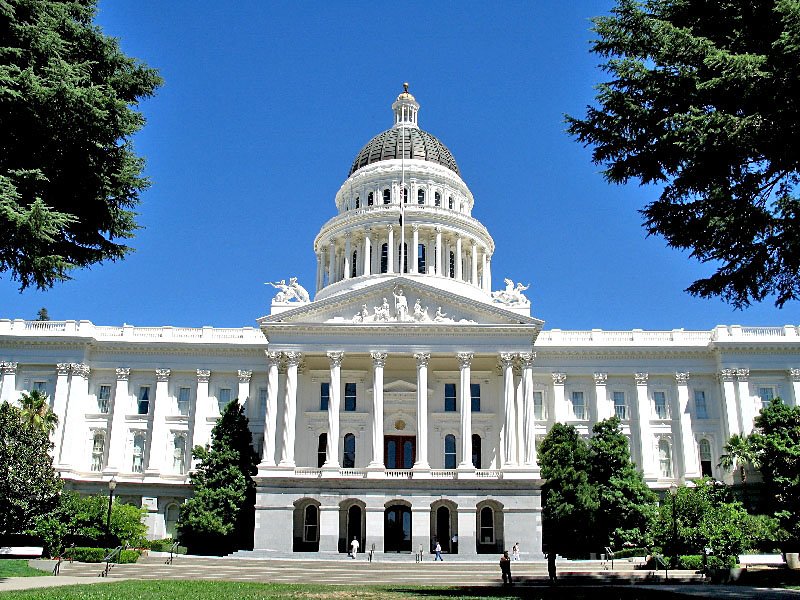
What to Expect In Enviro Policy During Another Unpredictable Year
MWD Board Puts More Money Into Planning Destructive Tunnel

Another two-year legislative session has begun and already, just weeks in, the unpredictable has become the norm.
The legislature was scheduled to return to business on January 4, but as most of California suffered from another surge in COVID-19, the legislature postponed the start of business until January 11. And in this era of much-needed caution, “regular” really isn’t that regular.
The Capitol Building itself is closed to most and legislative hearings are conducted in a way that allows the public to call in to provide testimony and comment. This approach is to reduce the number of people in the capitol building and to protect against unnecessary COVID risk.
Additionally, leadership in the Assembly is encouraging members to limit the number of bills they carry since scheduling and running committee hearings takes more time than during a normal year.
The deadline for getting bills introduced this year is February 19. So far this year, about 80 bills have been introduced that have environmental content. By February 19, that number will likely increase substantially, but we don’t expect it to be as high as during normal years, when bills with environmental keywords can exceed 600.
This year we expect to see a couple of bills that will put the oil and gas industry on edge. One will ban fracking, another will try again to ensure public health protection from new oil and gas drilling. We also expect to see bills that will address how to make sure that, as oil and gas use and production decline in the state, that there are other good jobs and job training for the former oil and gas workers.
A handful of bills that would reduce the use of gas in new buildings, including new public buildings, have been introduced. Additionally, we expect to see bills that try to determine how to better prepare for the effects of climate change, particularly sea level rise.
There will be another effort to reform the Department of Toxic Substances Control, and the governor included in his proposed budget in January a fee increase to support the reformed agency. That will require a two-thirds vote in the legislature.
The governor has also proposed funding incentives to help more rapidly move away from internal combustion engines in vehicles. This will help reduce air pollution and climate pollution.
As bills are filed, our staff research and analyze them, develop suggested positions, and then take those suggested positions to our volunteer legislative committee who establish the final position on the bill. By mid-March, we will post a list of priority bills on our website.
Individual Sierra Club members and local Sierra Club chapters should not independently take positions on bills. If a bill arises that a member or local chapter believes should have a Club position, please email our legislative committee chair Patricia Jones at sierraclubpatricia@gmail.com. She can make sure the committee considers it.
Also, if you want to track particular bills or learn more about a bill’s status, the state has an excellent bill information system online at http://leginfo.legislature.ca.gov.

After months of apparent behind-the-scenes hand-wringing, the board of the largest water wholesaler in Southern California voted to continue pouring tens of millions of dollars into planning an environmentally destructive Bay-Delta water tunnel that likely won’t produce promised water.
The soon-to-retire general manager, Jeff Kightlinger, of the Metropolitan Water District (MWD), which sells water to local water agencies throughout Southern California, presented four options to vote on at the board’s December 8 meeting.
One option would have rescinded the water district’s support for the tunnel entirely. One option would have provided no money for additional planning at this time because MWD’s overall plan for water sourcing is underway and not likely to be finished until April. Two options provided for paying different shares of the planning money--60 percent or 47 percent.
The 37-member board voted unanimously for the 47-percent option, which amounts to about $60 million in 2021. That’s in addition to more than $225 million the board has committed to tunnel planning and right-of-way access in recent years, including $50 million in April 2020.
The delta conveyance, commonly called the Bay-Delta tunnel, is the latest iteration of a failed effort begun more than 70 years ago to expand infrastructure to divert fresh water from the Northern California river system that feeds the San Francisco Bay Delta. That delta is the largest estuary on the West Coast of North America and is home to 750 different wildlife and plant species, including declining salmon populations.
Sierra Club California opposes construction of the environmentally destructive tunnel.
The tunnel will devastate the delta ecosystem. Also, during an era of climate change, freshwater from Sierra snowmelt is declining and there is no likelihood that the tunnel will consistently deliver affordable water. Moreover, the cost for the tunnel will be borne by water ratepayers around California, including in the MWD service area, for instance, who will not receive the water.
Water policy experts increasingly are urging that state, regional and local water agencies focus on conservation, efficiency and other measures, including recycling and stormwater capture, to help improve local and regional water supplies and reduce dependence on the delta water.
Sierra Club California sent 2,036 email letters ahead of the big vote on December 8, urging that the MWD board reject the tunnel idea entirely and vote for the option that would effectively end the agency’s irrational support for the tunnel. On hearing day, three-and-a-half hours of public testimony included comments from 60 Club members and our allies.
Opponents of the tunnel who testified ranged from Tribal leaders to scientists to high school students, from residents of the delta region to northern reservations to concerned Sierra Club members from Southern California and beyond. One volunteer, Layne Fajeau, stood out to his local press because of his dedication to bringing young people into the fold.
Water insiders told us that because of our constant public comments opposing the tunnel at various MWD meetings since the summer, the agency board was forced to consider four options on December 8 rather than just include the larger, 60-percent funding proposal as a consent item that would be voted on with no public testimony.
They also told us that, behind the scenes, MWD executives tried to rally support for the 60-percent option. Ultimately, the board voted for the lower--although still very, very high--option of 47 percent.
MWD is currently conducting a hiring search to replace General Manager Kightlinger when he retires in early 2021. Sierra Club California staff and volunteers have pushed for transparency in the hiring process.
We pushed the district to hold two public forums and a survey to allow the public to offer feedback on hiring criteria. The opposing factions of the MWD board--those who oppose a tunnel and those who support a tunnel--have both put forward their selections to sit on the committee responsible for hiring.
We are continuing to educate the public and raise awareness about the tunnel and smarter alternatives. Join us to get the word out so we are ready to mobilize the next time an action presents itself.

Last November, we launched the Dirty Dollars project to investigate and report out campaign donations from fossil fuel interests and allies to California state legislators and the Governor. You can read about and peruse that first edition here.
In the coming weeks, we will be releasing the January Update of the Dirty Dollars Report. The update will include all the newly elected Democrats in the Senate and Assembly along with all the Republicans. We will release another update in April that will include all remaining legislators.
Spoiler alert: As we research the campaign finances of the newly elected Democrats, we’re feeling pretty optimistic. Assemblymembers Alex Lee and Steve Bennett, and senators Dave Min, Josh Newman and Monique Limon can all boast zero dollars in contributions from oil and gas interests. We expect their clean wallets to be an asset for the environment and public health policy in the coming session.
Unfortunately, the finances of one Democrat who won in November produce anxiety. An oil-backed Political Action Committee (PAC) spent well over $2 million on independent expenditures in support of Assemblymember Carlos Villapudua and in opposition to his vanquished opponent Kathy Miller. Villapudua represents Assembly District 13 that includes the Stockton area.
All Republican legislators, newly elected and returning, also received dirty dollar campaign contributions.
There is much more to be discovered in the 78 spreadsheets that comprise the January Update of Sierra Club California’s Dirty Dollar Report. Watch our website for its release.
Follow Us:
  |
Thank you for being a part of our work! Consider making a monthly donation. You may securely donate online or by sending a check to Sierra Club California at 909 12th Street, Suite 202, Sacramento, CA 95814.
